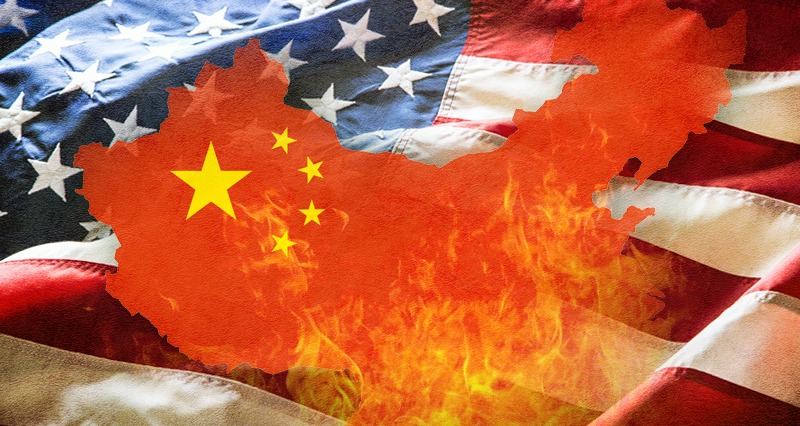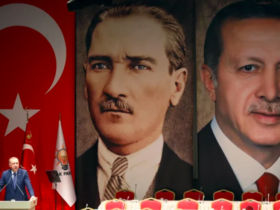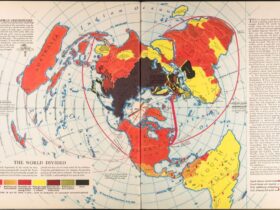Orçun Göktürk/ Beijing, China
China has recently hosted a number of high-level American politicians and business figures. First, US Treasury Secretary Janet Yellen arrived in Guangzhou, the landmark city of China’s Reform and Opening Up era, in early April. She was followed by US Secretary of State Blinken and, most recently, Tesla CEO Elon Musk.
US Treasury Secretary Yellen made a series of threats during her visit to China. “If China’s economic and technological support for Russia continues, sanctions will increase,” she said. Yellen repeated the liberal fable that China’s state-supported production growth far exceeds domestic demand and that this threatens world trade, and continued as follows:
“Cheap steel products, cheap electric vehicles and other green energy products created by state subsidies in China are flooding the global market. This is leading to the destruction of industries in the US and other countries. A similar situation happened 10 years ago. President Biden and I refuse to let it happen again. We know these concerns are shared by our allies and partners, from advanced economies to emerging markets.” (1).
The US uses the discourse of “global warming” as a “stick” against developing countries, while calling China “not to produce more green energy products”. This clearly reveals the hypocrisy of Western imperialism.
Two bad cops and one good cop?
After Yellen, it was US Secretary of State Antony Blinken’s turn. On April 25th, Blinken started his 3-day visit in Shanghai for discussions, and Politico, one of the leading organs of the American press, headlined: “Blinken in China to play bad cop” (2). However, Yellen, who came to China two weeks before Blinken, had already made all the threats at hand. Blinken picked up where Yellen left off: “Stop exporting materials that allow the Russian industry to rebuild, or you will face US sanctions.”
Of course, the two visits are related to the upcoming US Presidential elections. Even Elon Musk’s visit, who appeared in Beijing in an unannounced manner. Later, we will try to explain that his visit had a different context than Yellen and Blinken’s.
Returning to Blinken and Yellen, one of the agendas on the table during their visits to China was to convey the strategy of “elections are coming and we need to increase the hostility towards China against the Republicans”. So, it’s not hard to guess that Blinken privately warned Chinese officials that President Biden might adopt a tougher stance against China as the US presidential race heats up, and that this would reflect the current domestic political climate.
In practice, however, the US continues to escalate its anti-China actions. Let’s look at the developments before the visits.
Israel, Ukraine, and Taiwan…
As the geopolitical rupture in the world intensifies, there has been another development that shows that the US sees Ukraine, Israel, and Taiwan as a united front. Blinken arrived in China just hours after the US House of Representatives passed a multibillion-dollar ($95 billion) aid package to Ukraine, Israel and Taiwan that had been held up for months. The aid package allocates $8 billion to the Taiwanese government to “counter Chinese threats in Taiwan and the Asia-Pacific”. Although the separatists lost their majority in the island’s parliamentary elections, they still won the presidency, and the new administration will take office at the end of May. In a sense, the US is also trying to suppress the Taiwanese parliament through aid.
In addition, the US gave ByteDance, the owner of the famous Chinese social media application TikTok, nine months to sell its shares in the US. Otherwise, the application will be banned in the US.
Black propaganda of genocide
It is also important to note Blinken’s statement before his visit to China that “If China claims to want good relations with Europe and other countries, it cannot be fueling the greatest threat to European security since the end of the Cold War.”
In the run-up to the visit, Blinken continued the black propaganda against China on the Uyghur issue by referring to the US annual Country Reports, which again accused Beijing of “genocide and human rights violations, mainly against Uyghurs” (3), indicating that the visit would not include any sign of “détente”.
Did Musk come as Trump’s messenger?
On the afternoon of April 28, a surprise visit, which was not announced publicly, appeared in the Chinese press. Elon Musk arrived in Beijing and met with Chinese Premier Li Qiang. China’s new Premier Li Qiang is one of Xi Jinping’s most trusted men, but one of his most important characteristics is his close relationship with the private sector. When he took office, there was hope for him in the Western press. For example, on the day Li took office, a CNN report headlined “New PM seeks to reassure private sector amid concerns about future” (4).
In his first address, Premier Li also made sure to send a message to the West and the private sector, using the phrases “market-oriented approach” and that “the Chinese and American economies have benefited from each other’s development”. Premier Li also frequently recommends the anti-humanity and anti-civilization book Homo Deus by the Israeli author Harari for Chinese youth to read… (5)
When Elon Musk and Li Qiang, whose friendship goes back a long way, met in Beijing on April 28, Musk’s apparent goal was to launch autonomous driving technology, an advanced version of autopilot technology. And he got what he wanted in two days.
There were some who claimed that Musk’s visit was also aimed at conveying Trump’s messages to China in opposition to Yellen and Blinken. It is clear that Musk supports Trump. But Musk differs sharply from Trump’s China policy. For Tesla, the Chinese market is much more important than Trump’s encirclement strategy toward China, and he focuses on what is important to him. It is clear that Chinese capital also trusts its “classmate”. Musk is cherished every time he comes and many times even Xi Jinping is hastily arranged to meet him, even though he is not on the program. Elon Musk is the embodiment of the Chinese big bourgeoisie’s “win-win” strategy with the US bourgeoisie.
Moreover, for his own class interests, Musk is perhaps choosing the lesser of “two evils” in the US presidential election. This does not mean that he supports Trump strategically or that he is fully in line with all of Trump’s policy proposals. The big bourgeoisie in the US is divided into two groups: The Wall Street finance capital, represented mainly by Soros, and high-tech capital, represented by Silicon Valley elites like Gates and Zuckerberg. Musk is a member of this group of tech capital. He is an alternative, but as long as he is a big capitalist with transnational businesses, he has interests in neoliberal globalization (the unofficial agreement between the Chinese and US bourgeoisie). Moreover, China has overtaken Tesla to take the lead in the electric vehicle market and that India has imposed strict obligations on Tesla. These facts are putting Musk under a lot of pressure (Musk also has a lot to do with this, as he was supposed to meet Modi in India at the end of April to announce a $3 billion investment, but the visit was canceled). In a recent statement, it was announced that Tesla would lay off 10% of its global workforce (6). In all this troubled process, Musk seems to be trying to breathe.
The dilemma of Chinese foreign policy
In its basic approach, the United States continues to see China as its most important strategic rival and the most serious geopolitical challenge to the international order (7).
Chinese officials were hesitant to respond to their US counterparts. First, during Yellen’s visit, the US tried to press China mainly on two points: Trade and the Russia-Ukraine war. On trade issues, Chinese officials said, “We let Mrs. Yellen know that they expressed their disappointment with the American economic strategy,” while on the Russia-Ukraine war, they are in the dilemma of building a position from behind. In his reply to Yellen, Chinese Vice Premier He Liafeng explicitly stated: “China has a policy of not providing military support to Russia.” He voiced “optimism that the US and China can cooperate on this issue”.
After the meeting with Blinken, the Chinese maintained their defense position on Russia based on the “right to free trade”. “If we see no change in China’s technological and commercial support to Russia, we are looking at actions that we are fully prepared to take… We have already sanctioned more than 100 Chinese entities, imposed export controls, and we are fully prepared to take additional measures,” Blinken said, to which Chinese Foreign Minister Wang Yi responded: “Relations with the United States have been in a downward spiral as China’s legitimate right to development has been unreasonably suppressed and our core interests are facing challenges.”
China’s Deng Xiaoping-era strategy of “emphasizing economic development without attracting too much attention in foreign policy” has recently begun to change due to the dictates of geopolitics. However, the traces of traditional policy and the influence of the Chinese big bourgeoisie are narrowing the room for maneuver for China in many areas in extending its hand to the developing world.
In this respect, we see that China has not been as proactive and consistent as the US in geopolitical developments. Wang Yi has several times called on Iran to restrain the proxy groups it supports, including Hamas in Gaza, Hezbollah in Lebanon, the Houthis in Yemen and other forces.
China’s hesitant ‘support’ for Russia’s progressive war against NATO in Ukraine is another issue. Although the 12-point resolution announced by Xi Jinping states that the US and NATO instigated the war, the first article of the resolution states “Respect the sovereignty of all countries” and the third article states “Conflict and war benefit no one” (8). In a way, China evaluates the humanitarian war that Russia is waging against NATO and its pawns against the neo-Nazi regime in Kiev on the basis of “no winners” because the Chinese big bourgeoisie is uncomfortable with the war. As a matter of fact, in the face of China’s understanding that “We don’t supply weapons and our trade relations are none of your business”, the US is attacking and continues to pressure China on trade relations against Russia.
Of course, the opportunities that China offers to the developing world through the Belt and Road Initiative, BRICS and the Shanghai Cooperation Organization pave the way for a multipolar order. China’s relations with Europe are an indispensable part of this. On the one hand, German leader Olaf Scholz’s visit to China last month was covered in the US press with the headline “Why is the German leader bowing to the Chinese dragon?” (9). On the other hand, while Beijing is seen as the main factor in mending the rift between Iran and Saudi Arabia in West Asia, now the leaders of Hamas and Fatah are being hosted in Beijing again in an attempt to increase the influence of China’s peaceful diplomacy in the region and the world.
But the contradiction continues within China as well as on a global scale. In this struggle of two lines, will the Mao and Zhou En Lai era understanding of “anti-imperialist relations with oppressed world is the main key” prevail or the post-Deng Chinese big bourgeoisie’s understanding of “relations with big states is the key factor” on the basis of “let’s not scare the other side of the water”? Here lies the main factor determining the class contradiction of Chinese foreign policy and this will be the most decisive factor in the shaping of this century.
Sources
(1) Rappeport, A. (2024, April 6). U.S. Warns China About Its Exports and Support for Russia. The New York Times.
(2) Phelim, K. (2024, April 25). Blinken’s bad cop duty in Beijing. Politico. https://www.politico.eu/newsletter/china-watcher/blinkens-bad-cop-duty-in-beijing/
(3) Lewis, S. (2024, April 22). Blinken says genocide in Xinjiang is ongoing in report ahead of China visit. Reuters. https://www.reuters.com/world/blinken-says-genocide-xinjiang-is-ongoing-report-ahead-china-visit-2024-04-22/
(4) He, L. (2023, March 13). China’s new premier tries to reassure private sector amid widespread concerns about future. CNN Business. https://edition.cnn.com/2023/03/13/economy/china-new-premier-private-sector-yi-gang-intl-hnk/index.html
(5) Boyd, A. (2023, March 16). National People’s Congress Consecrates Xi’s Power, Installs Key Allies, Introduces New Agencies. China Digital Times (CDT). https://chinadigitaltimes.net/2023/03/national-peoples-congress-consecrates-xis-power-installs-key-allies-introduces-new-agencies/
(6) Elon Musk makes unannounced visit to China. (2024, April 28). The Guardian. https://www.theguardian.com/technology/2024/apr/28/elon-musk-makes-unannounced-visit-to-china
(7) Velez-Green, A. (2023, September 11). The Case for Urgency Against China. The National Interest. https://nationalinterest.org/feature/case-urgency-against-china-206790
(8) China releases position paper on Ukraine crisis political settlement. (2023, March 24). CGTN. https://news.cgtn.com/news/2023-02-24/China-releases-position-paper-on-Ukraine-crisis-solution-1hG16K9hLkA/index.html
(9) Karnitschnig, M. (2024, April 12). Why Germany’s Scholz is bowing to the Chinese dragon. Politico. https://www.politico.eu/article/why-germanys-scholz-is-bowing-to-the-chinese-dragon/

















Leave a Reply